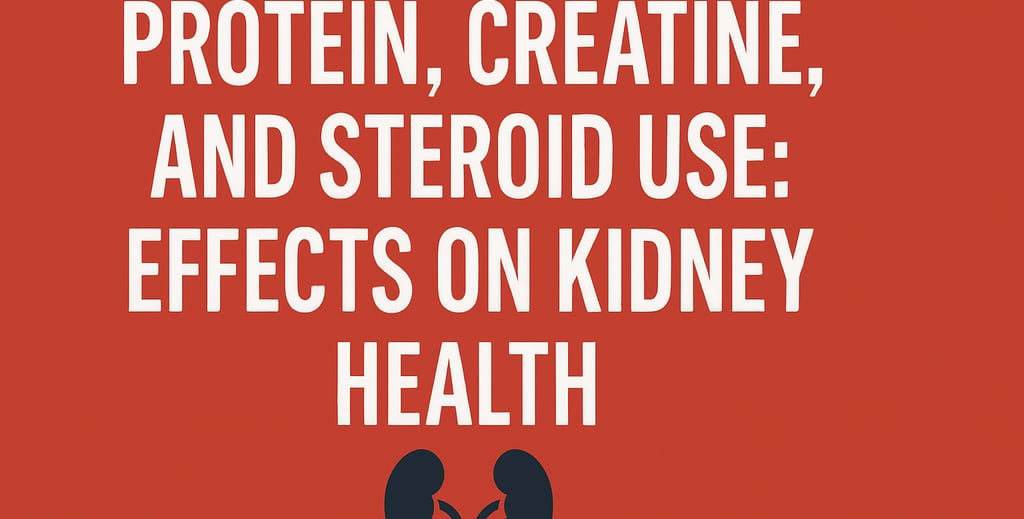Protein, Creatine, and Steroid Use: Effects on Kidney Health
One of the most common concerns in fitness and nutrition is whether high protein intake, creatine supplementation, or steroid use can damage the kidneys. This article breaks down the science behind these concerns with evidence from credible research publications including PubMed, ResearchGate, and Google Scholar.
HEALTH
5/20/20252 min read


Protein Intake and Kidney Health
The Concern
There is a widespread belief that high-protein diets can harm the kidneys by increasing the filtration load and producing excess nitrogenous waste.
The Truth in Healthy Individuals
Research has consistently shown that high protein consumption does not harm kidney function in healthy individuals.
A key study by Martin WF et al. (2005) published in the Journal of Nutrition concluded that increased glomerular filtration rate (GFR) in response to high protein intake is a normal adaptation, not a sign of kidney damage.
The International Society of Sports Nutrition (ISSN) supports protein intakes of up to 2.2 g/kg/day for active individuals without adverse effects.
In People with Kidney Disease
In individuals with chronic kidney disease (CKD), high protein intake can indeed worsen renal decline. Guidelines recommend 0.6–0.8 g/kg/day for those with moderate to advanced CKD.
KDIGO Nutrition Guidelines
Creatine Supplementation and Kidney Function
The Concern
Creatine increases serum creatinine levels, which often raises alarms. However, creatinine is a breakdown product of creatine, not a sign of kidney damage.
What the Research Says
A foundational study by Poortmans & Francaux (1999) demonstrated that long-term creatine supplementation does not impair renal function in healthy individuals.
A 2019 meta-analysis by De Souza E Silva et al. reviewed 28 studies and concluded there is no evidence that creatine harms kidney health.
Steroid Use and Kidney Health
The Concern
Unlike protein and creatine, anabolic steroid use has been strongly linked to kidney damage, especially in long-term or high-dose users.
Evidence of Harm
Herndon et al. (2002) found focal segmental glomerulosclerosis (FSGS) in bodybuilders using anabolic steroids—a serious form of kidney disease.
Review articles and case studies report issues like glomerular hypertrophy, hypertension, and chronic kidney injury in steroid users.
Google Scholar
ISSN has officially stated anabolic steroids pose significant renal risks and should not be used for performance enhancement.
Summary Points
Protein: Safe for healthy individuals up to 2.2 g/kg/day. Needs restriction in CKD.
Creatine: Safe for healthy individuals (3–5 g/day). Use with caution in CKD.
Steroids: Risky for everyone. Strong evidence links them to kidney damage.
Final Thoughts
Protein and creatine are safe and effective tools for fitness and body composition when used responsibly. However, anabolic steroid use is consistently associated with serious kidney risks.
For those concerned about kidney health:
Get routine blood tests (e.g., creatinine, BUN, eGFR)
Avoid unregulated supplement use
Never use anabolic steroids without medical supervision
For sustainable, science-backed nutrition and training plans, follow @TeluguFitnessCoach.
Achieve fitness goals with personalized coaching today.
Contact US
Quick Links
sravankumarbalivada@gmail.com
+91 8121412668
© 2024. All rights reserved.
SRAVAN BALIVADA FITNESS
